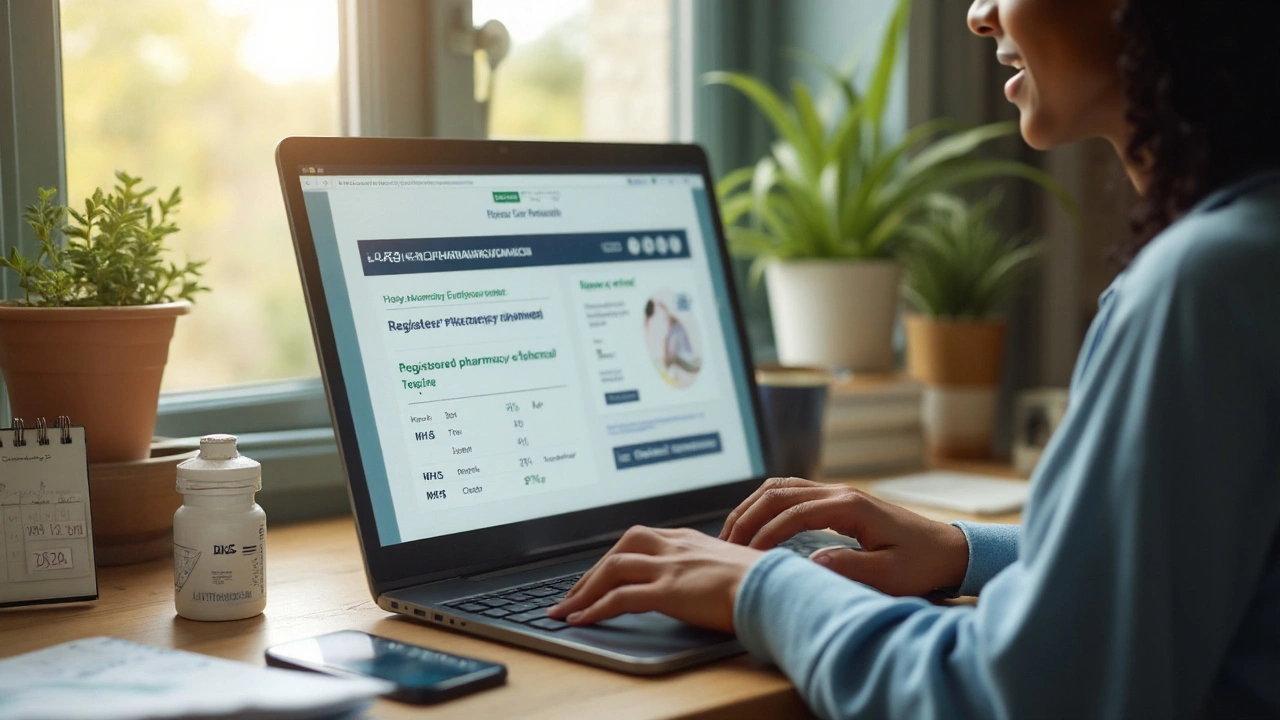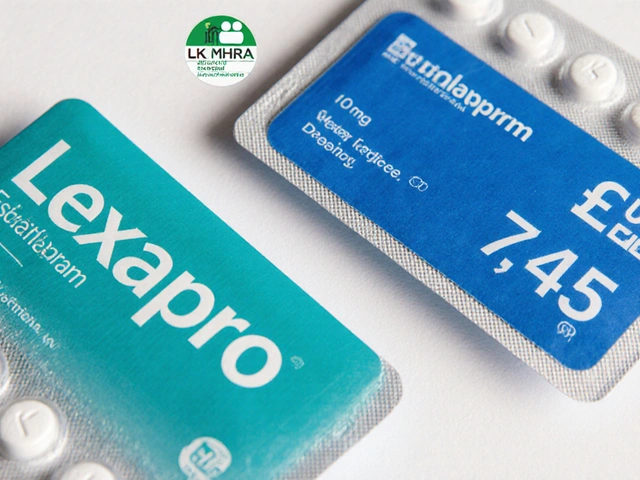You came here to save money and time on thyroid meds without risking dodgy pills. Fair. Here’s the straight path: how to find a legit UK pharmacy, what “cheap” really looks like in 2025, when NHS beats private, and the exact steps to order levothyroxine safely. I live in Bristol and I’ve watched friends overpay because they didn’t know two simple things-how to compare the total price (med + fees + delivery) and how to spot a fake pharmacy. You won’t make that mistake.
If you searched for “Synthroid,” you’re really after levothyroxine. In the UK, the generic is standard. You can buy generic Synthroid online from a registered UK pharmacy, but you’ll need a valid prescription. I’ll show you how-ethically and without shortcuts that put your health at risk.
What “cheap generic Synthroid” really means in the UK
Quick reality check: “Synthroid” is a U.S. brand name for levothyroxine. In the UK, most patients take the generic. It’s the same active ingredient-levothyroxine sodium-used to replace thyroid hormone when your thyroid doesn’t make enough.
Here’s what you actually get when you buy online in the UK:
- Medicine name on the pack: “levothyroxine sodium.” Not usually “Synthroid.”
- Common tablet strengths: 25, 50, 75, 100, 125, 150, 200 micrograms. Some online sites carry 88, 112, 137 micrograms mainly for people used to U.S. doses.
- Prescription-only status: It’s a POM (prescription only medicine). A legit UK pharmacy will ask for an NHS prescription, a private prescription, or offer a private online consultation with a UK prescriber.
- Consistency matters: UK guidance (MHRA/NHS) says stick to the same product/manufacturer once you’re stable. Small differences in absorption can cause symptoms when switching brands or manufacturers. If a switch happens by accident and you feel off, get a TSH check and speak to your GP.
Who should not use shortcuts: anyone starting levothyroxine, anyone changing dose, people who are pregnant or trying to conceive, children, people with heart disease, and those with recent abnormal TSH/T4 results. You need GP input and proper blood test monitoring. That’s not box-ticking-it’s safety.
Realistic UK prices in 2025-and how to pay less
Levothyroxine is cheap as a product. The price you pay depends on where the cost lands: NHS charge versus private prescription fee, pharmacy margin, and delivery. Work out the total before you click buy.
Rules of thumb:
- NHS repeat = best value if you pay the single NHS charge per item. The England NHS per-item charge was £9.90 in 2024. Expect a similar ballpark in 2025; check the current figure. If you’re exempt, it’s free.
- NHS prepayment certificate can save money if you have 2+ items a month. It caps your yearly spend. Worth checking if you also take statins, BP tablets, or asthma inhalers.
- Private online = good only when: a) you’re between GP prescriptions, b) you need a short bridging supply, or c) your employer/insurance covers it. Otherwise, fees stack up.
What drives private online cost:
- Medicine price (cheap for levothyroxine)
- Private prescription/consultation fee (often £10-£25)
- Delivery (£0-£5 for standard; £5-£9 for next-day)
| Strength & pack (example) | Typical med price (private) | Private Rx/consult | Delivery | Estimated total |
|---|---|---|---|---|
| Levothyroxine 50 mcg, 28 tabs | £1.50-£3.00 | £10-£20 | £0-£4 | £11.50-£27 |
| Levothyroxine 100 mcg, 28 tabs | £1.50-£3.50 | £10-£20 | £0-£4 | £11.50-£27.50 |
| Levothyroxine 100 mcg, 84 tabs (3 months) | £4-£9 | £10-£20 | £0-£4 | £14-£33 |
| Mixed doses (e.g., 50 + 25 mcg), 2 items | £3-£7 | £10-£20 | £0-£4 | £13-£31 |
Compare that with NHS: one item charge for each strength. Many patients use two strengths to fine-tune dosing (say 100 mcg and 25 mcg). On NHS you’d pay two item charges unless exempt. Private might still be dearer when you add the consultation fee, but if a pharmacy waives it for repeats, the math can flip.
How to pay even less (without cutting corners):
- Ask your GP to consolidate doses into a single strength if safe (e.g., switch from 100 + 25 mcg to 125 mcg). Fewer items can reduce NHS charges and simplify refills.
- Order 10-14 days before you run out. Last-minute next-day delivery often doubles the price.
- Use NHS online repeat prescription services through your GP surgery or a GPhC-registered online pharmacy that connects to your GP. Delivery is often free.
- If private, buy a 3-month supply when medically appropriate-one consultation fee, one delivery, three months sorted.

Buy safely: the non-negotiable checks to avoid fake or unsafe thyroid tablets
Counterfeit thyroid meds exist. They can be under-strength, over-strong, or contaminated. That’s how you end up jittery, exhausted, or with scary palpitations. Use these checks every time:
- Confirm the pharmacy is on the General Pharmaceutical Council (GPhC) register. Click the “Registered pharmacy” logo on the site and follow the link to the official entry with the same URL and details.
- Look for a UK address and a UK superintendent pharmacist on the GPhC entry. No address, no buy.
- Check the medicine’s UK license. The pack should list a PL number and UK manufacturer or distributor. If the site offers “no prescription needed,” close the tab.
- Avoid social media sellers and marketplace listings. Regulated UK pharmacies do not sell prescription levothyroxine through DMs.
- Packaging should match what the manufacturer uses in the UK: clear batch number, expiry date, and patient leaflet inside. If the leaflet is in another language or missing, report it to the MHRA Yellow Card scheme via an official route.
- Price that’s too good to be true is a red flag. Legit sites make money on the consultation and delivery, not by selling “£0.10 Synthroid, no Rx.”
What reputable online clinics do (and cowboys don’t):
- Ask for your GP details and recent TSH/T4 blood results, especially for first-time or dose-change requests.
- Refuse to supply if your request looks unsafe. That’s a good sign, not a hassle.
- Provide a UK prescriber’s name and registration number on your private prescription.
Authoritative sources you can trust: NHS guidance on hypothyroidism, the British National Formulary (BNF) for dosing and interactions, the MHRA for medicine safety alerts, and the GPhC register for pharmacy checks. If what a website says conflicts with these, don’t buy.
Picking the right dose and product: brand vs generic, switching, and interactions
Levothyroxine dosing is personal. The “right” dose is the one that normalizes your TSH/T4 and makes you feel well, checked by blood tests. Buying a different strength because it’s on sale is not smart.
Brand vs generic in real life:
- Same active ingredient: levothyroxine sodium.
- Differences: excipients, tablet hardness, and bioavailability wiggles. UK safety advice says keep to the same product once you’re stable.
- If you notice new symptoms after a switch (palpitations, anxiety, sweats, headaches, fatigue), arrange a blood test and speak to your GP. Don’t auto-increase or cut tablets without advice.
| Option | Best for | Watch-outs |
|---|---|---|
| UK generic levothyroxine | Most people on stable doses | Stick with same manufacturer; note if tablet look/packaging changes |
| Branded levothyroxine (e.g., Eltroxin) | Patients sensitive to switches or with prior issues | May be pricier; ensure ongoing availability from same brand |
| Unlicensed imports (e.g., U.S. Synthroid) | Only if a UK prescriber justifies it clinically | Special-order rules; not a routine choice; needs proper oversight |
Common strengths and simple math:
- If you take 125 mcg daily, you can get one 125 mcg tablet-or combine 100 + 25 mcg.
- Small variances day to day are fine; it’s the weekly total that matters. If you miss a dose, take it when you remember the same day; if it’s the next day, skip-don’t double up without advice.
Interactions that quietly ruin absorption (and your blood tests):
- Take levothyroxine on an empty stomach with water, ideally 30-60 minutes before breakfast.
- Keep at least 4 hours away from iron, calcium, magnesium, antacids, and some multivitamins.
- Coffee can interfere if you swallow the tablet and sip instantly-wait 30 minutes.
- Pregnancy can raise dose needs; get early blood tests and expect adjustments.
- Biotin (often in hair/nail supplements) can skew lab results-tell the lab if you take it.
When not to tweak on your own: after surgery, weight changes of 10%+, during pregnancy or menopause shifts, and with heart rhythm issues. That’s GP territory.

How to order online step by step, plus FAQs and next steps
Two safe routes: NHS repeat through a registered online pharmacy linked to your GP, or private online with a UK prescriber. Here’s the quickest way to get it right.
NHS route (usually cheapest):
- Check your current dose on your GP repeat list (e.g., 100 mcg once daily).
- Choose a GPhC-registered online pharmacy that offers NHS repeat ordering and delivery.
- Request your repeat 10-14 days before you run out.
- Approve the order in your GP app if needed. Track dispatch and delivery.
- If you pay charges, compare one-off item charge versus a prepayment certificate if you take multiple items regularly.
Private online route (when you need it fast or can’t access your GP):
- Pick a GPhC-registered online clinic. Confirm prescriber credentials and UK base.
- Complete the clinical questionnaire honestly. Have your latest TSH/T4 results ready.
- Upload your existing prescription if you have one; if not, the clinic can assess and issue a private prescription if safe.
- Select your exact dose and quantity. Avoid brand switches unless advised.
- Choose standard delivery unless you truly need next-day. Order early next time.
Payment tips:
- Compare the total: medicine + prescription fee + delivery.
- Watch for sneaky “subscription” auto-renew toggles. Turn them off unless you want them.
- Keep invoices. They help with expense claims and tracking batch numbers.
Fast decision guide:
- If you’re stable and have repeats: use NHS online-cheapest and simplest.
- If you’ve run out and can’t see your GP in time: private online, one-month supply, then back to NHS.
- If your dose changed recently or you feel off: don’t buy a different dose online. Speak to your GP and get bloods.
FAQs
- Can I buy levothyroxine online without a prescription? No. In the UK it’s prescription only. Sites that say otherwise are unsafe.
- Is generic the same as Synthroid? Same active ingredient. Stay with one product if you’re stable, per UK safety guidance.
- What’s a fair private price? For 28 tablets, the med itself is often under £3. The true cost is your consultation plus delivery. Total £12-£30 is typical.
- How long does delivery take? 2-4 working days standard; next-day is common if you order before a cut-off hour.
- What if my tablets suddenly look different? Check if the manufacturer changed. If symptoms change, arrange a TSH/T4 blood test.
- Can I switch dose sizes to save money? Only if your prescriber agrees. It’s safer to keep to the prescribed dose/brand.
- Are there supply shortages? They happen. A good pharmacy will contact you, offer an equivalent UK-licensed product, or liaise with your prescriber.
Troubleshooting common snags
- Order stuck “awaiting GP approval”: Call the surgery’s prescription line or use the patient app to nudge it. Keep at least a week’s buffer in future.
- No recent blood tests: Book TSH/T4 first. Reputable clinics may decline without recent labs for dose changes.
- Side effects after a brand switch: Don’t panic. Keep taking it, book a test within 6 weeks, and speak to your GP about switching back.
- Pregnancy or planning: Tell your prescriber immediately-dose adjustments are common and important.
Clear, ethical next steps
- If you have a current repeat prescription: set up NHS online repeat with a GPhC-registered pharmacy today and request your next supply.
- If you’re out of meds: use a UK-registered online clinic for a one-month private supply, then return to your NHS repeat.
- Before any change in brand/dose: check in with your GP or prescriber and plan a blood test window (usually 6-8 weeks after changes).
- Always verify the pharmacy on the GPhC register and keep receipts and batch numbers.
Why you can trust this process: it lines up with NHS advice on hypothyroidism treatment, BNF dosing standards, MHRA safety alerts about switching products, and GPhC requirements for online pharmacies. Do the checks once; you’ll shop safer forever. And yes-you’ll save money without gambling with your thyroid.








Dan Dawson August 26, 2025
Saved me a trip to the pharmacy, cheers for the clear delivery tips.
Chris Fulmer August 28, 2025
NHS prepayment certificates are massively underrated and the post nails why.
For people in countries where the GP system lets you bundle repeats, that certificate can cut a year's cost down when you take multiple items, not just thyroxine.
Also, asking your GP to consolidate into a single strength when clinically safe is a pro move that most folks won't think of, but it saves you two item charges and lessens the chance of a pharmacy accidentally sending mixed packs.
William Pitt August 30, 2025
Practical tip from my experience: set calendar reminders for 10 days before you run out and add a one-week buffer every few months.
It sounds boring, but doing that made switching between NHS and private for short gaps painless for me.
Also keep a photo of your prescription and batch numbers in cloud storage so if anything goes weird you have the info to hand for the MHRA or your GP.
Albert Gesierich September 1, 2025
Small but important precision: levothyroxine is indeed a POM and UK pharmacies follow strict rules about private prescriptions, but the post could emphasize that the private prescriber must document clinical justification on the prescription when issuing non-standard formulations.
That paperwork is what protects both patient and pharmacy and keeps imports or branded exceptions on the right side of regulation.
Recording the prescriber's GMC or GPhC number on the paperwork makes follow-up far cleaner.
Jeff Hershberger September 3, 2025
Love the no-nonsense checks list, especially about pack leaflets and PL numbers.
People treating their meds like cheap gadgets usually end up regretting it, and thyroid stuff is not where you want to skimp.
Kelly kordeiro September 6, 2025
I have to say this in full, because there is a certain theatricality to how people treat prescription medicine that I find simultaneously baffling and exasperating, and the post slices through the noise with admirable bluntness.
First, levothyroxine is not a glamorous commodity, and treating it as if it were some flexible consumer product invites mistakes that can ripple through a person’s life in subtle, corrosive ways.
Second, the breakdown of cost drivers here is invaluable because most buyers only look at the sticker price and not the whole ledger, which includes consultation fees, delivery, and the rare but consequential administrative snafus.
Third, the insistence on sticking with one manufacturer once stability is achieved is not nitpicking-it is the single most pragmatic thing a patient can do to avoid churning their blood results and symptomatic state.
Switching for a tenner saved on a website can cost weeks of dysphoria and re-titration, and the post captures that trade-off cleanly.
Fourth, for anyone who has ever been pregnant, or planning pregnancy, the rules change and rapidly so: dose needs creep, monitoring is more frequent, and the wrong impulse to self-adjust based on anecdote is exactly the hazard the guide warns against.
Fifth, the advice to keep documentation-batch numbers, leaflets, purchase invoices-is small but military-grade practical; regulators and GPs can only act when the patient hands them something tangible to work with.
Sixth, the emphasis on using only GPhC-registered pharmacies deserves repetition until people internalize it; parallel-market sellers often try to emulate legitimate sites and the visual cues alone can mislead the inattentive buyer.
Seventh, the interaction list is crisp and correctly prioritises iron, calcium and antacids; the coffee note is underrated and worth repeating because many people are ritualistic about their morning cup.
Eighth, the approach to private prescriptions as a bridge rather than a steady-state solution is exactly how patients regain control without burning through cash or safety.
Ninth, the suggestion to consolidate pills into single-strength doses where safe is a prescriptive finesse that cuts costs and cognitive overhead equally, and it should be part of every medication review.
Tenth, the supply shortage contingency advice-letting the pharmacy suggest an equivalent UK-licensed product or liaise with the prescriber-is the sort of procedural knowledge that reduces panic during shortages.
Eleventh, the practical invoicing tip for expense claims and batch tracking speaks to those who need to claim back costs or monitor for recalls, and it's often overlooked by patients focused just on pills.
Twelfth, the post leans on the right sources: NHS, BNF, MHRA, GPhC; leaning on those institutions prevents the kind of deformed heuristics that circulate in forums.
Finally, the whole tone of operating within the NHS framework unless there is a compelling exception is a stance that saves people money and medical grief, and it deserves the kind of firm advocates that this guide clearly is.
Jennifer Romand September 8, 2025
The long list of pragmatic steps is exactly the kind of thing people need to bookmark and actually follow when they run low, not days after panic sets in.
Keeping a rolling 2-week buffer, consolidating items, and keeping receipts are boring and brilliant moves that save stress and money.
Also the point about biotin messing with labs should be shouted from the rooftops more often because it's so commonly overlooked.
Jesse Najarro September 10, 2025
That NHS route is the one I always recommend to friends; private makes sense sometimes but the fees add up fast.
Also uploading recent TSH results when doing a private consult speeds the process and reduces the chance the clinic will refuse the script.
Lawrence Jones II September 12, 2025
Good checklist, especially the part about avoiding social media sellers and keeping batch numbers 📦💊
Saved me from a dodgy listing once and I still check PL numbers before I click buy.
Robert Frith September 14, 2025
Stick with the NHS where possible, that’s the bottom line in my book.
Private clinics have their place but they shouldn’t become the default for routine repeats, and this post explains that neatly.
Jeff Hershberger September 16, 2025
Agree on the NHS angle and the bit about paperwork, but people need to be a bit sharper about expiry dates on packs too.
I've seen pharmacies send near-expiry stock and a quick glance would have saved a headache.
William Pitt September 18, 2025
Exactly, check expiry and batch numbers when you open the pack, not later, and photograph them for your records.
Dan Dawson September 21, 2025
Yep, photo backups have been a lifesaver for recalls and insurance claims.
Albert Gesierich September 23, 2025
The clinical documentation point from earlier needs stressing again: when a private prescriber issues an unlicensed import or brand exception, they must put a clear clinical rationale on the prescription, and that should be readily available to the pharmacy and the patient.
Without that rationale the legal footing becomes shaky and the patient loses protection if something goes wrong.
Prescribers who shortcut paperwork are creating downstream risks, not efficiencies.
Keeping a copy of that private prescription in your records is prudent and often overlooked.
Chris Fulmer September 25, 2025
Following that, always ask the clinic to email you the prescription PDF so you have a timestamped record of what was issued and why.
It's a small admin step that pays dividends if there's ever any dispute about what was prescribed or supplied.